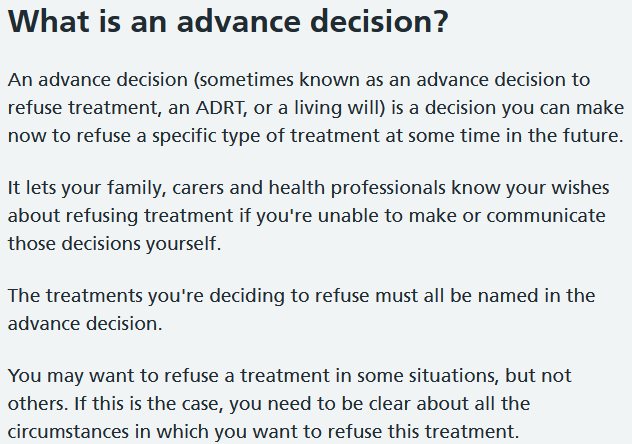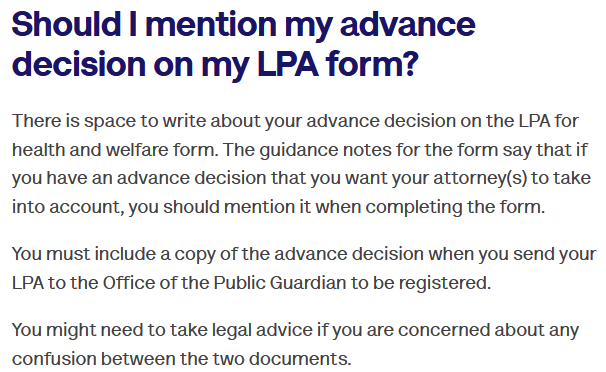What is the difference between a Lasting Power of Attorney and an Advance Decision to Refuse Treatment?
For a free 15 minute consultation to discuss your Lasting Power of Attorney please Speak To Me here.
Increasingly people are asking to complete an Advance Decision to Refuse Treatment (ADRT) at the same time as a Lasting Power of Attorney (LPA). I am happy to support with drafting an ADRT and this blog addresses some common questions on the differences between LPAs and ADRTs.
What is a Lasting Power of Attorney
A Lasting Power of Attorney is a document that enables you to chose in advance who would speak for you if you ever lost the capacity to make decisions for yourself through a sudden accident or a progressive disease. You can find out more here.
A Lasting Power of Attorney enables someone to speak on your behalf, but does not have to specify examples or what your wishes are. There is a section for you to add preferences and instructions but it is not a mandatory part of completing a Lasting Power of Attorney.
You can find out more and see examples of what might be included as a preference or instruction here.
It’s really important that you talk to your attorneys about What Matters Most to you so that if they ever need to make a decision they will know what to do. I write about this more in the blog LPA Registered: what next?
The key takeaway is a Lasting Power of Attorney enables someone to make decisions for you but does not need to specify what these decisions are.
What is An Advance Decision to Refuse Treatment?
An Advance Decision to Refuse Treatment is a legal document which sets out specific treatments you may wish to refuse in the future. The NHS provides the following definition:
To make a valid Advance Decision to Refuse Treatment:
- A person must be over 18 and have capacity
- The Advance Decision to Refuse Treatment must be written down, signed and witnessed
- It must also have the following statement "I confirm the following refusal of treatment even if my life is at risk or may be shortened as a result”
An Advance Decision to Refuse Treatment could include clinically assisted nutrition and hydration, mechanical ventilation, antibiotics for a life-threatening condition and cardio pulmonary resuscitation. Compassion in Dying provide a template for making an Advance Decision to Refuse Treatment.
You can listen to Advance Decision to Refuse Treatment with Celia Kitzinger to find out more about an Advance Decision to Refuse Treatment. Celia shares how a devastating family experience provided the catalyst for her work and provides clarity and insight into ADRTs and the MCA . Celia talks through the process of making an ADRT and why an Advance Statement of wishes and preferences is so very important.
The key takeaway is an Advance Decision enables a person to refuse a specific treatment in a specific circumstance.
What takes priority, a Lasting Power of Attorney or an Advance Decision to Refuse Treatment?
Deciding whether a Lasting Power of Attorney or an Advance decision to Refuse Treatment takes propriety It depends on the order they were written in. The most recent document will take priority recent document will take priority, this means that if you write an Advance Decision to Refuse Treatment before a Lasting Power of Attorney then your attorneys could potentially override the Advance Decision to Refuse Treatment.
What are the similarities in a Lasting Power of Attorney and an Advance Decision to Refuse Treatment?
A Lasting Power of Attorney and an Advance Decision to Refuse Treatment are both options you can to plan ahead for a time when you may not have capacity, they are both part of Advance Care Planning. When creating either document it would be good to have a supporting Advance Statement of your wishes, whilst not a legal document an Advance Statement can be a valuable tool for you to set out your wishes and preferences.
Using Joy Lists can be another way of documenting your wishes and what is important to you. I have the pleasure of talking with Andrew Sanderson about Joy Lists and you can hear Andrew explain how they can help in Advance Care Planning.
The following table summarises the key differences between a Lasting Power of Attorney and an Advance Decision to Refuse Treatment
I hope this blog has answered some questions about differences between Lasting Power of Attorney and Advance Decisions to Refuse Treatment. Both help you plan for a time when you may lose capacity through sudden accident or progressive disease, both enable you to have more control – the Lasting Power of Attorney by nominating someone to be your future voice and an Advance Decision to Refuse Treatment by saying now what you don’t want in the future.
If you want to find out more or wish to enquire about making your Lasting Power of Attorney or Advance Decision to Refuse Treatment contact me.




